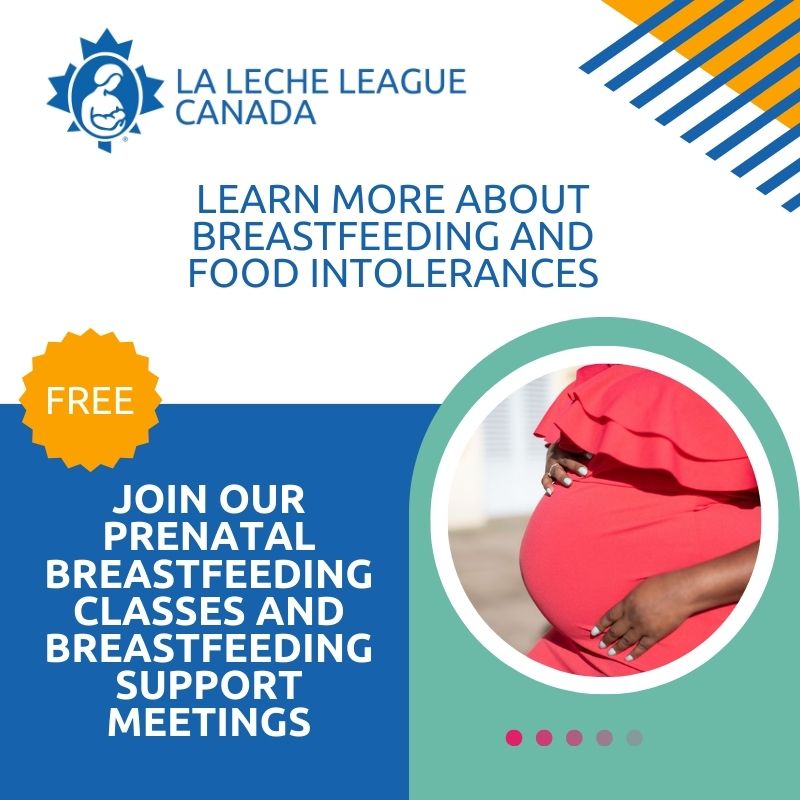It can be helpful to know that most breastfeeding mothers can eat any and all foods while breastfeeding. Nursing parents from different cultures all over the world eat a variety of foods and children thrive on their mother’s milk.
Only about 5% of breastfeeding babies under one year of age react to a food that their mothers eat. The most common food for babies to react to is cow’s milk.

People sometimes confuse ‘allergies’ with ‘intolerances’ or ‘sensitivities’. Food ‘intolerances’ and ‘sensitivities’ do not cause an immune response and although they may cause discomfort they do not cause severe or dangerous symptoms. Fussiness and irritability during feedings caused by food intolerance may be uncomfortable but is not dangerous to your child.
An allergic reaction to a food involves a sudden immune response to what the body perceives as an invader. The body tries to protect itself by releasing histamine, causing symptoms that can range from unpleasant to dangerous, often affecting many parts of the body. Your baby usually has to eat a food more than once before they show signs of allergy. If they have a severe allergy their second and subsequent exposures can cause a more serious reaction.
Symptoms of an allergic reaction may include one or more of the following: skin reactions such as eczema and rashes, hives; itchy mouth or throat; swelling of the face and tongue; gastrointestinal issues such as vomiting, diarrhea, bloody stools and pain; and respiratory issues such as wheezing, coughing, and trouble breathing. The most common food allergens are peanuts, cow’s milk, shellfish, tree nuts, egg, fish, soy and wheat.1
Exclusive breastfeeding right from birth reduces your baby’s chances of developing an allergy. This is especially important if you or your partner have a personal or family history of allergies. The introduction of cow’s milk based infant formula increases a baby’s risk of developing an allergy. The younger the baby is when cow’s milk protein is introduced, the more likely a baby is to develop an allergy. One 2019 study revealed that babies who are given infant formula in the first 24 hours of life are 16 times more likely to develop a cow’s milk protein allergy.2
Children who have severe eczema, egg allergy or both, may be at particular risk of peanut allergy. Your baby should be evaluated and followed by a healthcare provider; introducing peanut protein earlier than six months may be suggested as a preventative measure. Babies who have only mild allergic symptoms should be introduced to peanut protein at 6 months of age. And babies who have no allergic symptoms or history of food allergy can be introduced to peanut foods anytime between six months and one year of age. If you suspect that your baby may have a severe allergy to peanuts, or any other severe allergy, consult your healthcare provider.3

If a breastfed baby does develop an allergy to a particular food, it is possible that this baby will react to this food in his mother’s milk. Usually, reactions occur in the baby within 1 to 2 hours after the mother has consumed the allergen. If you suspect that your baby has a sensitivity or allergy to a particular food, you can eliminate this food from your diet to see if this improves your baby’s symptoms. Symptoms may improve within a few days. Particularly with cow’s milk protein, it may take a few weeks to see any difference.
Exclusive breastfeeding and the timing of the introduction of solid foods can help prevent allergies in babies. The World Health Organization and Health Canada both recommend that babies be exclusively breastfed for the first 6 months, with the introduction of solid foods after 6 months of age, and continued breastfeeding for up to 2 years and beyond.4
If you are expecting a baby, attend La Leche League Canada’s Breastfeeding Essentials class to prepare and build your confidence before your baby arrives. See our online calendar to find an upcoming class near you.
La Leche League Canada is a not-for-profit, peer-support organization that has been providing evidence-based breastfeeding information and support for over 60 years. There are more than 260 La Leche League Leader volunteers. Leaders provide email and phone support and host in-person and virtual Group meetings where breastfeeding parents can share experiences, information, challenges and successes. You can find your local Group and Leader contact information on our website.
References
1 Food allergy vs. food intolerance: What is the difference and can I prevent them? Canadian Pediatric Society. https://caringforkids.cps.ca/handouts/healthy-living/food_allergies_and_intolerances
2 Kelly, E. DunnGalvin, G., Murphy, B.P., et al. (2019). Formula supplementation remains a risk for cow’s milk allergy in breast-fed infants. Pediatric Allergy and Immunology. doi:10.1111/pai.13108
3 Togias, A., Cooper, S.F., Acebal, M.L, et al. (2017). Addendum guidelines for the prevention of peanut allergy in the United States. Report of the National Institute of Allergy and Infectious Diseases-sponsored expert panel. Pediatric Dermatology, 34(1), e1-e21.
4 Health Canada. (2023, Nov 3). Breastfeeding your baby. https://www.canada.ca/en/public-health/services/child-infant-health/breastfeeding-infant- nutrition.html


